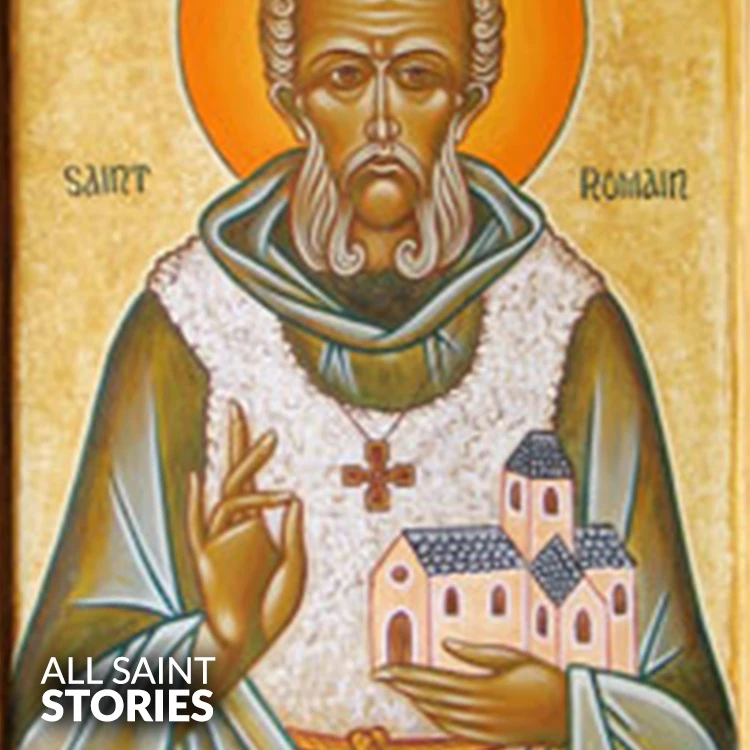O Holy St. Romanus, who sought the silence of the mountains to hear God’s voice more clearly, inspire us to seek solitude for prayer and purity of heart. Guide us to live in humility, charity, and simplicity as you did. Intercede for us in our needs and help us walk the path of holiness with faith and perseverance. Amen.
ST. ROMANUS OF CONDAT
ST. ROMANUS OF CONDAT

St. Romanus of Condat was a 5th-century monk and hermit who founded monasteries in the Jura Mountains. Living a life of solitude, prayer, and asceticism, he helped shape early Western monasticism alongside his brother, St. Lupicinus.
St. Romanus of Condat, also known as St. Romanus of the Jura, was born around the year 390 in the region of Burgundy, within what was then Roman Gaul. Inspired by the lives of the Desert Fathers and early Christian ascetics, Romanus withdrew from society to live a life of solitary devotion in the remote Jura Mountains. His retreat into the wilderness was not simply an escape from the world, but a deliberate journey into deeper communion with God through prayer, fasting, and manual labor.
As his reputation for sanctity grew, other seekers of the divine were drawn to him. Among them was his own brother, St. Lupicinus, who shared his spiritual vision. Together, they established several monastic communities that emphasized the principles of early Christian monasticism: communal living under a spiritual rule, ascetic discipline, and a balance of prayer and work. Chief among these foundations was the Abbey of Condat, which would become a major religious center in medieval France, later renamed Saint-Claude Abbey.
Romanus also founded the monastery of Leuconne and contributed to the spiritual and cultural development of the Jura region. His model of monastic life predated the formal Rule of St. Benedict and represented one of the earliest expressions of organized monasticism in Western Europe. The monastic communities he established would later influence broader Christian religious practices throughout the Frankish kingdom and beyond.
His sister, St. Yole (or Yola), also lived a life of sanctity, and the three siblings are often celebrated together in Christian hagiography. Romanus was known not only for his rigorous asceticism but also for his compassion, wisdom, and ability to attract and guide disciples. Miracles and spiritual insights were often attributed to him, further amplifying his status as a holy man in his time.
He died around the year 463, leaving behind a vibrant and enduring monastic tradition. Though he lived centuries before formal canonization processes were established, Romanus was recognized as a saint by the Church based on his virtuous life, miracles, and the enduring spiritual legacy of his monastic foundations. He is venerated as a patron of hermits and monastic founders, and his feast day is celebrated on February 28.
Video Not Found
The information on this website is compiled from various trusted sources. While we aim for accuracy, some details may be incomplete or contain discrepancies.
If you notice any errors or have additional information about this saint, please use the form on the left to share your suggestions. Your input helps us improve and maintain reliable content for everyone.
All submissions are reviewed carefully, and your personal details will remain confidential. Thank you for contributing to the accuracy and value of this resource.
Credits & Acknowledgments
- Anudina Visudhar (Malayalam) – Life of Saints for Everyday
by Msgr. Thomas Moothedan, M.A., D.D. - Saint Companions for Each Day
by A. J. M. Mausolfe & J. K. Mausolfe - US Catholic (Faith in Real Life) – Informational articles
- Wikipedia – General reference content and images
- Anastpaul.com – Saint images and reflections
- Pravachaka Sabdam (Malayalam) – Saint-related content and insights
We sincerely thank these authors and platforms for their valuable contributions. If we have unintentionally missed any attribution, please notify us, and we will make the correction promptly.
If you have any suggestion about ST. ROMANUS OF CONDAT
Your suggestion will help improve the information about this saint. Your details will not be disclosed anywhere.
© 2026 Copyright @ www.allsaintstories.com



 English
English
 Italian
Italian
 French
French
 Spanish
Spanish
 Malayalam
Malayalam
 Russian
Russian
 Korean
Korean
 Sinhala
Sinhala
 Japanese
Japanese
 Arabic
Arabic
 Portuguese
Portuguese
 Bantu
Bantu
 Greek
Greek
 German
German
 Dutch
Dutch
 Filipino
Filipino